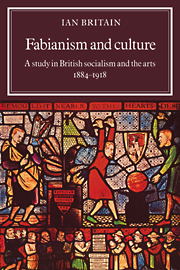Book contents
- Frontmatter
- Contents
- Preface
- List of abbreviations
- Introduction
- PART I THE LITERARY AND ARTISTIC ORIGINS OF FABIAN SOCIALISM
- PART II ART, AUSTERITY AND PLEASURE IN FABIAN SOCIALISM
- PART III FABIANISM, ÉLITISM AND POPULAR CULTURE
- 9 Fabian attitudes to working-class culture
- 10 Fabians, art and democracy
- Conclusion
- Notes
- Bibliography
- Index
9 - Fabian attitudes to working-class culture
Published online by Cambridge University Press: 29 September 2009
- Frontmatter
- Contents
- Preface
- List of abbreviations
- Introduction
- PART I THE LITERARY AND ARTISTIC ORIGINS OF FABIAN SOCIALISM
- PART II ART, AUSTERITY AND PLEASURE IN FABIAN SOCIALISM
- PART III FABIANISM, ÉLITISM AND POPULAR CULTURE
- 9 Fabian attitudes to working-class culture
- 10 Fabians, art and democracy
- Conclusion
- Notes
- Bibliography
- Index
Summary
Beatrice Webb's statement, quoted above, that her and Sidney's aim as socialists was to collectivize ‘the kitchen of life’ so that ‘all may have freedom for the drawing-room of life’ cannot be taken literally; at the same time, it cannot be dismissed as just a handy and insignificant metaphor. It does seem to assume (however unconsciously) that the ambience of the drawing-room, which permeated so many of the activities of the Fabian Society, represented a standard of well-being and enjoyment to which all sections of society must want to aspire. Referring in later years to the ideal of the ‘good life’ which they saw enshrined in the social aims of the Bolshevik leaders in the U.S.S.R., the Webbs identified its attributes more precisely with those enjoyed ‘by the professional classes of London or Paris’ — with ‘the conditions of a cultivated existence’ among ‘men of considerable education who had been trained as lawyers, doctors, professors, scientists and writers of books’. This represented a quite specific linking in the Webbs' minds between the mode of life to which they and most of the Fabians had long been accustomed and the one which they thought best for everyone else.
- Type
- Chapter
- Information
- Fabianism and CultureA Study in British Socialism and the Arts c1884–1918, pp. 223 - 252Publisher: Cambridge University PressPrint publication year: 1982

